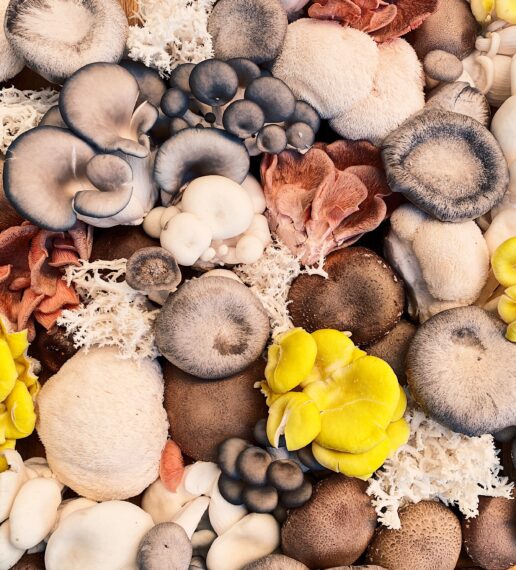How To Build A Strong Immune System With Mushrooms
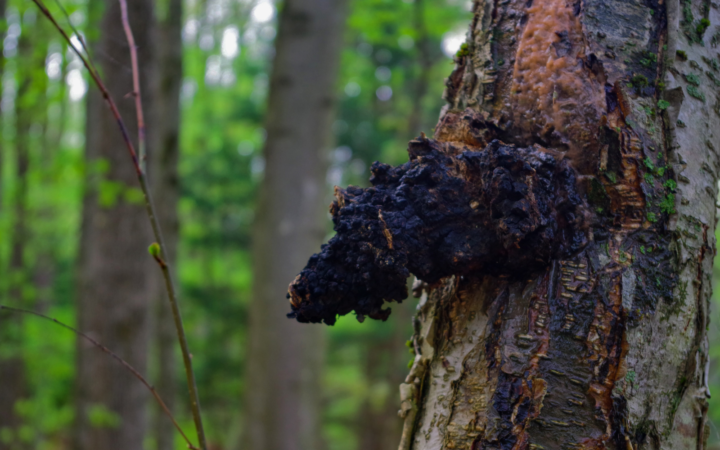
A strong immune system is crucial for defending your body against all types of diseases.
Most people look into strengthening their immune response during flu season when they want to ward away a common cold or respiratory infection.
The truth is, optimal immune function is also vital for protecting against cancer, regulating blood pressure, reducing your risk of heart disease, and maintaining overall health.
Instead of trying to boost your immune system, focus on helping it balance or regulate itself. People with autoimmune disorders like diabetes, lupus, or rheumatoid arthritis, for example, have overactive immune systems that attack healthy cells.
Yes, citrus fruits and veggies are excellent for vitamin C, vitamin A, and plenty of other essential nutrients, but you may not realize that medicinal mushrooms are the optimal superfoods for improving your immune response.
How to Boost Your Immune System with Mushrooms
Ancient indigenous cultures around the world, especially in China and India, understood the importance of mushrooms for supporting immune cells.
Modern Western science has started to catch up. You can now find plenty of studies on the immune-boosting power of medicinal mushrooms, but science has only just started unveiling the healing powers of mushrooms.
Mushrooms make an excellent choice for improving your immune function because, unlike many vitamins and supplements, they don’t heighten your immune response, they regulate it.
If you have an overactive immune system causing autoimmune flareups from diseases like rheumatoid arthritis, there’s a mushroom that can help calm your immune response.
If you have an underactive immune system and find yourself suffering from cold symptoms all too often, there’s a mushroom for that, too.

Your Secret Weapon to Improve Your Immune Response: Beta-Glucans
Mushrooms provide plenty of vitamin C, B vitamins, vitamin D, and other essential nutrients, however, the real immune-supporting power comes from a type of fiber called beta-glucans.
Mushrooms aren’t all created equal.
Of course, some species are harmful- even deadly! Edible medicinal mushrooms, however, contain several bioactive compounds to support cellular processes across the entire body — especially in brain neurons and immune cells.
Mushrooms contain several types of carbohydrates known as polysaccharides.
When it comes to building a resilient and strong immune system, you want a specific type of polysaccharide called beta-glucan. Beta-glucans play an important role in strengthening and stimulating white blood cells like T-cells, B-cells, and Natural Killer cells.
Maintaining a healthy balance of these cells is your secret weapon for building a balanced immune response.
Modern scientific research around the immune-boosting power of beta-glucans is still in its infancy. However, studies already show significant promise.
Chaga mushrooms, for example, have intense anti-cancer and anti-tumor health benefits. (1) Turkey tail mushroom also helps improve immune systems of cancer patients by stimulating Natural Killer cells. (2) (Just two small examples.)
If you needed more evidence, healthcare workers administer beta-glucans through an IV to help patients with HIV, hepatitis, cancer, chronic fatigue, and a broad range of illnesses. (3)
Immune-Boosting Anti-Inflammatories and Antioxidants
When people think of immune health, they usually don’t consider age-related chronic conditions like dementia or cancer.
Well, they should because a healthy immune system is vital for not only defending against infectious diseases, but also regulating how the body responds to cancer cells, damage to brain cells, and toxic invaders.
Unfortunately, your immune response weakens with age. The good news is that certain species of mushrooms contain the highest antioxidant levels of any food.
Antioxidants, inflammation, and the immune system are all closely linked. When something is thrown off, it kicks off a vicious cycle:
- Unchecked free radicals cause oxidative damage to cells across the entire body and limit their ability to function.
- Your damaged cells become inflamed
- The immune system responds to the injury (usually with more inflammation)
- Immune function deteriorates from overwork
- The cycle continues.
Here’s the thing. Many people don’t realize that inflammation and free radicals aren’t inherently bad: they’re your body’s natural response to toxins and injury.
The key here is balance.
When you combine the antioxidants and anti-inflammatory health benefits of mushrooms with their beta-glucans and other bioactive compounds, you get an unstoppable force to build a strong immune system in the perfect harmony.
Mushrooms Improve Gut Microbes
You may have heard that probiotics (good bacteria) are essential for supporting a healthy immune system.
Mushrooms are fungi, not bacteria. However, many experts and studies say that mushrooms activate your gut microbes and stimulate immune cells.
While mushrooms like white buttons and reishi contain polysaccharide fiber which qualifies as a prebiotic, they also seem to stimulate microbes in a unique way, similar to a probiotic.
The bioactive compounds in mushrooms also defend your immune cells against damage like hardening and plaque build-up due to age and environmental toxins – and it all happens in your digestive system.

Health Benefits Beyond the Immune System
Your immune system doesn’t function alone. Every part of your body relies on the other parts to function and mushrooms provide holistic health.
Let’s look at stress, for example. Studies show that chronic stress, depression, and anxiety can all weaken your immune system and make you more susceptible to infectious diseases. (4, 5)
Have you ever noticed that cold sores pop up at the worst possible times? It’s because high levels of cortisol and stress wreak havoc on your immune function.
Bioactive substances in mushrooms can improve neuroplasticity, encourage brain cell growth, support healthy oxygen and blood flow to the brain, and so much more. That’s why studies show certain mushroom species are particularly beneficial for reducing stress, preventing memory loss, and defending against diseases like Alzheimer’s.
Immune Boosting Mushrooms
Shiitake, portabella, and white button mushrooms are great for eating in your sautés and curries. While they certainly have plenty of health benefits, they aren’t the best mushrooms if you want to build a strong immune system.

Reishi
While Asian cultures call reishi the “mushroom of immortality,” Westerners have dubbed this fungus “nature’s Xanax.”
Whatever you want to call it, reishi can help reduce inflammation, stimulate natural killer cells, and relieve stress.
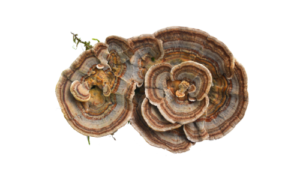
Turkey Tail
You’d be hard-pressed to find a mushroom with more immune-boosting potential than turkey tail.
Aside from beta-glucans, turkey tail contains other polysaccharide peptides and krestin to both stimulate and suppress the immune system in unique ways.
With turkey tail, you also get powerful anti-inflammatory properties.
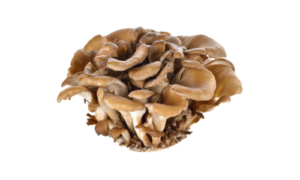
Maitake
As an adaptogen, maitake defends your immune response and cells across the body from stress and toxins. You can add maitake to the growing list of mushrooms under evaluation for cancer research. (7)
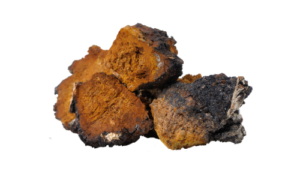
Chaga
If you suffer from chronic inflammation damaging your immune function, turn to chaga.
When it’s not suppressing cancer cells, chaga can be found reducing blood sugar and cholesterol. (8)
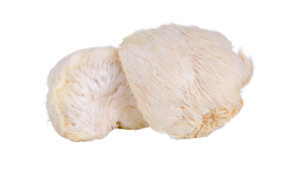
Lion’s Mane
If you don’t think a mushroom can be “pretty,” you’ve probably never seen lion’s mane.
Lion’s mane is a popular ingredient in many nootropics because it stimulates the brain’s nerve growth factor and has a positive effect on people with depression, multiple sclerosis, autism, and other central nervous system disorders. (9)
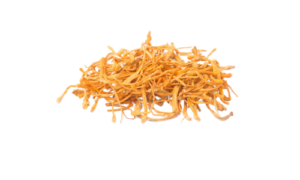
Cordyceps
In terms of antioxidants, it’s hard to beat cordyceps.
Antioxidants are essential for defending your immune cells against free radical damage and oxidative stress. Studies show that cordyceps might actually destroy tumor and cancer cells without damaging healthy cells. (10)
How to Build a Strong Immune System: 7 Tips
- Moderate exercise: Exercise is one example of healthy inflammation and stress. Experts say that moderate exercise may improve white blood cell counts and reduce cortisol levels to lower chronic stress. (11)
- Eat plenty of veggies: Kale, sweet potatoes, bell peppers, along with other leafy greens and bright orange or red veggies are all packed with immune-boosting antioxidants, beta-carotene (vitamin A), vitamin C, and countless other nutrients.
- Consider other herbs and supplements: Echinacea is an especially beneficial herb for supporting immune health.
- Green tea: Have you heard enough about the health benefits of green tea yet? Here’s your reminder that an afternoon cup of green goodness is loaded with antioxidants to support your immune system.
- Reduce chronic stress: Stress, especially over a long period of time, absolutely destroys your physical health and immune system. Try meditation, moderate exercise, journaling, writing down to-do lists, limiting social media, or speaking with a qualified doctor about your stress and cortisol levels.
- Take a multivitamin every day: Your body absorbs vitamins and minerals better from food compared to vitamins. However, it’s just not possible to consume all the important nutrients you need through food alone every day. Make sure to take a multivitamin every day to fill the gaps.
- Vitamin C from fruit: Citrus fruits, kiwi, grapefruit, lemons, limes, oranges, and pineapple are all delicious choices.
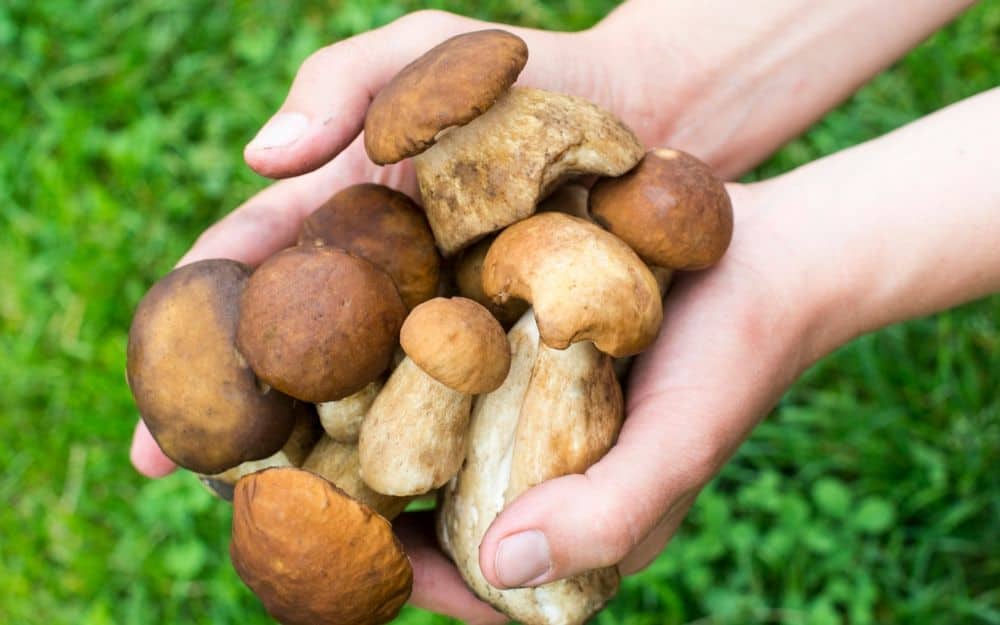
Mushrooms: The Keys to a Healthy Immune System
Hopefully, you unlocked some new knowledge about mushrooms and immune function from this article. Many people aren’t aware of the intense healing power of mushrooms.
Fortunately, science is starting to catch up as more people search for natural solutions to improve their overall health.
If you want to build a strong immune system that’s well-balanced – not overactive or underactive – you can’t go wrong with medicinal mushrooms!
